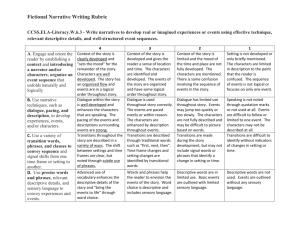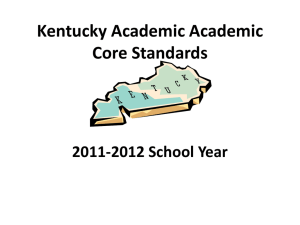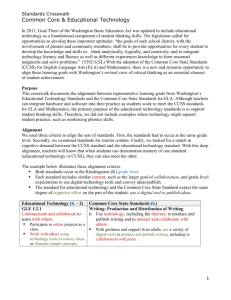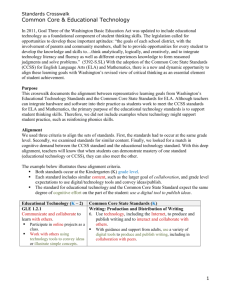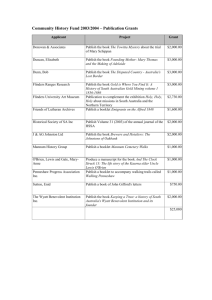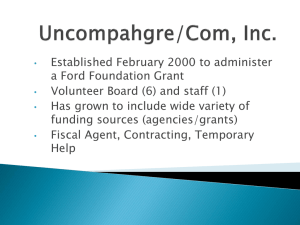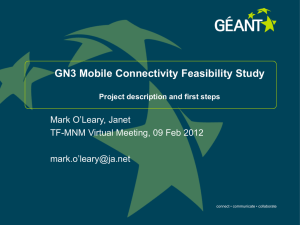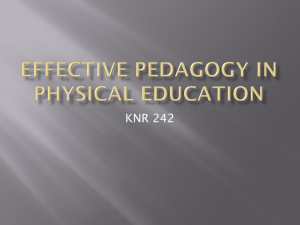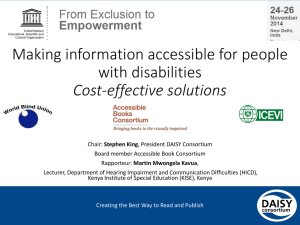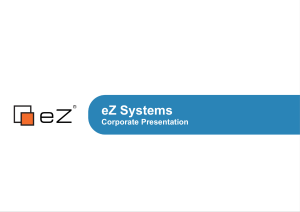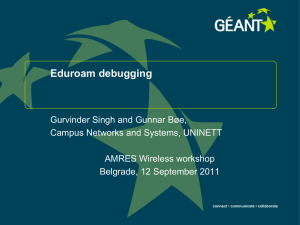Technology in the Common Core State Standards
advertisement
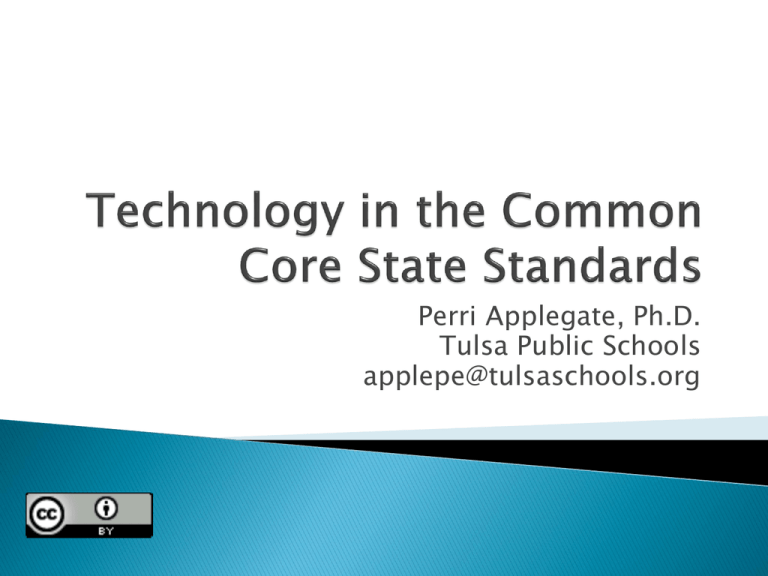
Perri Applegate, Ph.D. Tulsa Public Schools applepe@tulsaschools.org http://tech4ccss.blogspot.com National Governors Association and Council of Chief State School Officers Standards for ◦ English Language Arts ◦ Mathematics ◦ Literacy in History/Social Studies, Science, and Technical Subjects Focus on critical thinking Increased Lexile levels Focus on informational texts Emphasis on argumentative writing ALL teachers are expected to teach literacy Task: Create a story around four of the images below. Drag the images you have chosen to the filmstrip. Click the area beneath each image on the filmstrip to record narration for that image. Use the Play All button to see the end result. Task: This entry within a user-edited encyclopedia has four content errors. Use the link to the National Geographic Web Site to research the Emperor Penguin. Correct the errors by clicking the EDIT buttons and making these small corrections to eliminate the four errors. To be ready for college, workforce, and life in a technological society, students need the ability to ◦ Gather, comprehend, evaluate, synthesize, and report on information and ideas. ◦ Conduct original research in order to answer questions or solve problems. ◦ Analyze and create a high volume and extensive range of print and nonprint texts in media forms old and new. Common Core State Standards for English Language Arts & Literacy in History/Social Studies, Science, and Technical Subjects, Key Design Considerations, p. 4 Students who are college and career ready use technology and digital media strategically and capably. p. 7 Tailor their searches online to acquire useful information efficiently Integrate what they learn using technology with what they learn offline Are familiar with the strengths and limitations of various technological tools and mediums and can select and use those best suited to their communications goals p. 7 They need to be able to use technology strategically when creating, refining, and collaborating on writing. They have to become adept at gathering information, evaluating sources, and citing material accurately… p. 41 6. Use technology, including the Internet, to produce and publish writing and to interact and collaborate with others. 8. Gather relevant information from multiple print and digital sources, assess the credibility and accuracy of each source, and integrate the information while avoiding plagiarism. p. 41 6. Use technology, including the Internet, to produce and publish writing and to interact and collaborate with others. Standards spiral With guidance and support from adults, explore a variety of digital tools to produce and publish writing, including in collaboration with peers. (W.K.6) With guidance and support from adults, use a variety of digital tools to produce and publish writing, including in collaboration with peers. (W.1.6) With guidance and support from adults, use technology to produce and publish writing (using keyboarding skills) as well as to interact and collaborate with others. (W.3.6) With some guidance and support from adults, use technology, including the Internet, to produce and publish writing as well as to interact and collaborate with others; demonstrate sufficient command of keyboarding skills to type a minimum of one page in a single sitting. (W.4.6) With some guidance and support from adults, use technology, including the Internet, to produce and publish writing as well as to interact and collaborate with others; demonstrate sufficient command of keyboarding skills to type a minimum of two pages in a single sitting. (W.5.6) Use technology, including the Internet, to produce and publish writing as well as to interact and collaborate with others; demonstrate sufficient command of keyboarding skills to type a minimum of three pages in a single sitting. (W.6.6) Use technology, including the Internet, to produce and publish writing and link to and cite sources as well as to interact and collaborate with others, including linking to and citing sources. (W.7.6) Use technology, including the Internet, to produce and publish writing and present the relationships between information and ideas efficiently as well as to interact and collaborate with others. (W.8.6) Use technology, including the Internet, to produce, publish, and update individual or shared writing products, taking advantage of technology’s capacity to link to other information and to display information flexibly and dynamically. (W.9-10.6) Use technology, including the Internet, to produce, publish, and update individual or shared writing products in response to ongoing feedback, including new arguments or information. (W.11-12.6) New technologies have broadened and expanded the role that speaking and listening play in acquiring and sharing knowledge and have tightened their link to other forms of communication. Digital texts confront students with the potential for continually updated content and dynamically changing combinations of words, graphics, images, hyperlinks, and embedded video and audio. p. 48 2. Integrate and evaluate information presented in diverse media and formats, including visually, quantitatively, and orally. 5. Make strategic use of digital media and visual displays of data to express information and enhance understanding of presentations. They need to be able to use technology strategically when creating, refining, and collaborating on writing. 2. Integrate and evaluate information presented in diverse media and formats, including visually, quantitatively, and orally. 5. Integrate and evaluate content presented in diverse formats and media, including visually and quantitatively, as well as in words. 7. Integrate and evaluate content presented in diverse media and formats, including visually and quantitatively, as well as in words. Hardware Software Infrastructure Skills
